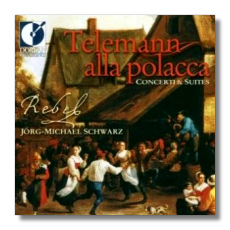
The Internet's Premier Classical Music Source
Related Links
- Telemann Reviews
- Latest Reviews
- More Reviews
-
By Composer
-
Collections
DVD & Blu-ray
Books
Concert Reviews
Articles/Interviews
Software
Audio
Search Amazon
Recommended Links
Site News
 CD Review
CD Review
Georg Philipp Telemann

Telemann alla polacca
- Suite in E flat for Flûte Pastourelle, Strings & Continuo, TWV 55, Es 2
- Concerto in D for Traverso, Strings & Continuo, TWV 51, D 2
- Concerto Polonoise in B Flat for Strings & Continuo, TWV 43, B 3
- Suite in A minor for Recorder, Strings & Continuo, TWV 55, a 2
Rebel/Jörg-Michael Schwarz
(Karen Marie Marmer, co-director)
Dorian DOR-90302 DDD 73:02
For years, like Henny Youngman, the prolific Georg Philipp Telemann got "no respect." He was weighed in the balance with Bach and found wanting. Even respected musicologists perpetuated the story that all of his music sounds more or less the same. In the past few years, however, a reassessment of Telemann seems to be taking place, and outstanding recordings by ensembles such as Musica Antiqua Köln have led open-minded listeners to reevaluate Telemann's legacy.
Rebel, named after French composer Jean-Féry Rebel (so the accent is on the second syllable), plays in a style quite similar to that of Musica Antiqua Köln. Its members perform on period instruments, attempt to replicate period style, and keep the music lean and lively. Rapid tempos, a controversial characteristic of MAK recordings, are to be found here as well. They don't obscure the enormous rhythmic vitality of Telemann's music, however, and they never play sloppily, so I don't find their tempos problematic.
This CD is called "Telemann alla polacca." The title is an allusion to the composer's familiarity with Polish musical idioms. Baroque composers understood that their financial success depended on their ability to write music in various national styles: French, German, and Italian styles were the most central. More than many of his contemporaries (even Bach), Telemann recognized what Poland had to offer Western Europe. It didn't hurt that, as a young man, he spent time in regions in and around present-day Poland, and he made admiring note of the instruments, dances, and melodies that he witnessed there. These influences subsequently appeared in his music, albeit not literally – you won't find any polkas here! Instead, the effects of Telemann's Polish years were more subtle, although listeners of the time might have found the resulting music relatively exotic. The Suite for Flûte Pastourelle contains arguably Polish elements in the Ouverture and in some of the dance movements. (The Flûte Pastourelle is something that folk musicians might have played, and Rebel is lucky to have had access to an instrument otherwise displayed in a Danish museum. Its tone is piping and gracious, perhaps in between that of a soprano recorder and an Irish penny-whistle!) In contrast, the Concerto in d for Traverso (a transverse flute, i.e., one that is blown into from the side) and the Suite in A minor for Recorder, Strings, and Basso Continuo are among Telemann's most famous works. The latter work's final movement is a "Polonoise" [sic – the original spelling is used]. Annotator John Moran (Rebel's cellist) argues that the opening Moderato of the Traverso Concerto also is influenced by Polish styles; the composer himself admitted that he wrote entire works based on Polish music, hiding the influences under Italian titles. The fourth work on this CD is a "Concerto Polonoise." Although Telemann tampered with even basic characteristics of Polish folk music (Chopin would have blanched at the idea of a polonaise in duple time!), it can be argued that the melodic contours and accent patterns in this work and others on this disc are typical of Polish dance music – if not necessarily of one particular form or another. At any rate, the four works on this CD are anything but dull, and their vitality – irrespective of national origins – will appeal to just about anyone who has a taste for Baroque music.
Dorian's engineering is outstanding. The recording was made in the Troy Savings Bank Music Hall.
Copyright © 2003, Raymond Tuttle


















